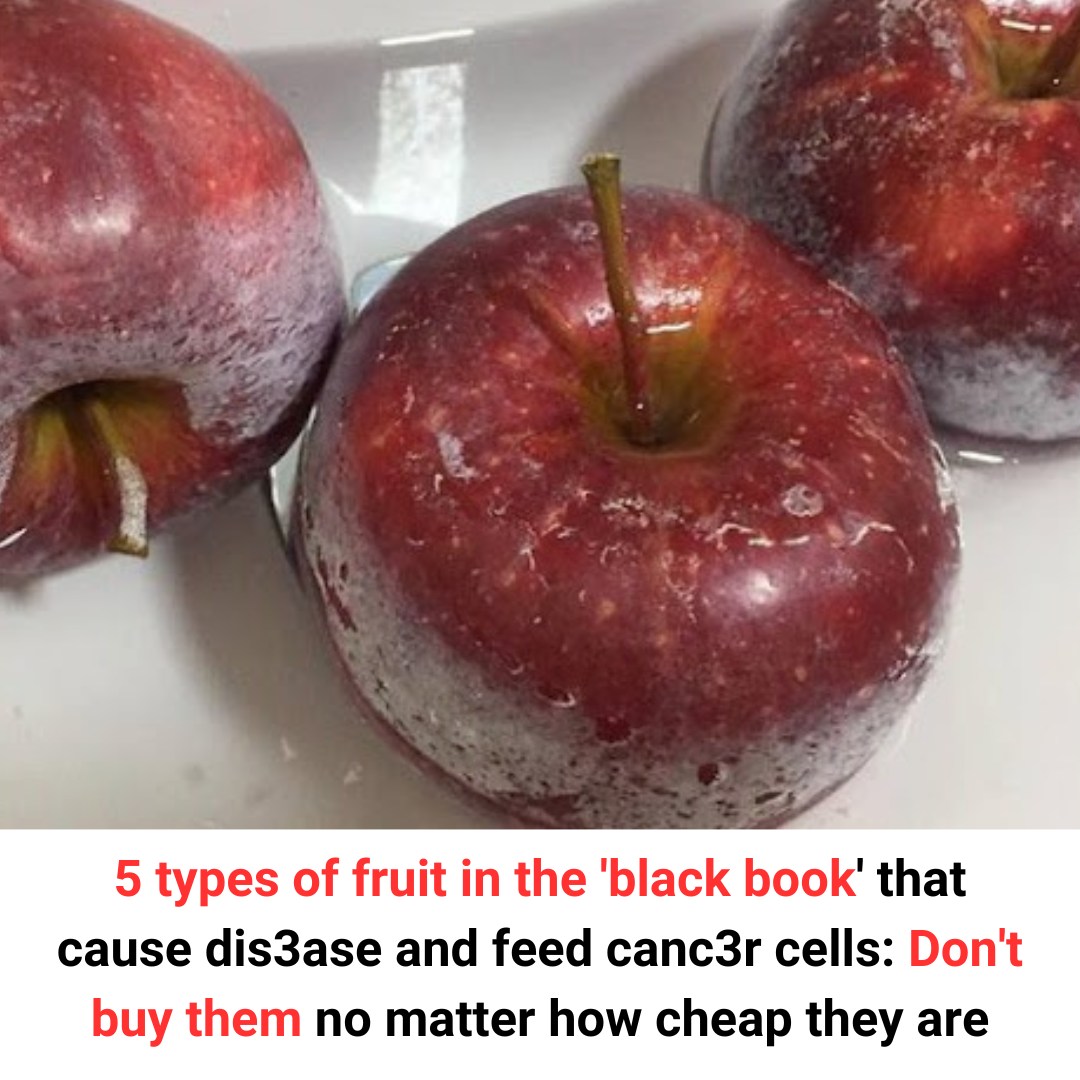In today’s world, people are becoming increasingly mindful about the food they eat, particularly fruits and vegetables. Shoppers prioritize produce that is clean, in season, and sourced from reliable sellers to minimize the risk of consuming harmful chemicals or toxins. However, despite these precautions, there are still certain types of fruits that experts strongly advise against eating due to their potential health risks, including a heightened risk of cancer.

Here are five types of fruits that health experts have placed in the “black book” due to their association with serious health concerns.
1. Rotten Fruit: Aflatoxin and the Risk of Liver Cancer
Rotten fruits might seem like an inexpensive option, especially when they are being sold at heavily discounted prices. While some people believe that cutting away the moldy or spoiled parts makes the fruit safe to eat, experts warn against this misconception. Moldy fruits often contain a dangerous toxin known as aflatoxin, which is classified by the World Health Organization (WHO) as a carcinogen.
Aflatoxin is a highly toxic compound produced by certain molds that grow on fruits, especially in warm and humid conditions. Consuming aflatoxin-contaminated fruit, even after cooking or cutting away the moldy portions, does not eliminate the risk. This toxin primarily targets the liver, causing diseases such as hepatitis and, in severe cases, liver cancer.
Moreover, eating spoiled fruit can lead to digestive problems such as nausea, diarrhea, and bloating. No matter how appealing the discounted price may be, it’s always better to discard rotten fruit rather than risk your health.
2. Betel Nut: Linked to Oral Cancer
Betel nut, often paired with betel leaves, is a traditional cultural item in many Asian countries. However, research from the International Agency for Research on Cancer (IARC) has shown a strong link between chewing betel nut and the development of oral cancer.
When chewing betel nut, the rough texture can cause abrasions and peeling on the soft tissues inside the mouth. These small injuries become vulnerable to the carcinogenic compounds present in the nut and accompanying betel leaves. Over time, repeated exposure can lead to chronic inflammation, abnormal cell growth, and eventually, cancer of the mouth or throat.
In addition to cancer risks, chewing betel nut is also associated with gum disease, tooth decay, and other oral health issues. While it may hold cultural or social significance, its health risks far outweigh any perceived benefits.
3. Cold-Stored Tropical Fruits: Nitrite Formation and Cancer Risk
During hot weather, cold-stored tropical fruits are often a popular choice. However, experts warn that refrigerating tropical fruits for prolonged periods can result in the formation of nitrites, which are known to be potentially carcinogenic.
Fruits like mangoes, pineapples, and papayas are naturally rich in sugars and nutrients, but they are not well-suited for long-term cold storage. Under low temperatures, chemical changes can occur, leading to the production of nitrites. When consumed in large quantities over time, these nitrites can increase the risk of certain cancers, particularly stomach cancer.
For this reason, it’s best to consume tropical fruits fresh and avoid prolonged refrigeration. If you do need to store them in the fridge, aim to eat them within a day or two to prevent chemical changes.
4. Artificially Ripened Fruits: Chemical Residues and Health Risks
Fruits that are artificially ripened using chemicals like calcium carbide pose a significant health risk. These chemicals are often used to speed up the ripening process of fruits such as bananas, mangoes, and papayas so they can reach markets faster.
Calcium carbide contains traces of arsenic and phosphorus, both of which are highly toxic to humans. Prolonged exposure to these chemicals through fruit consumption can cause health problems ranging from stomach disorders and headaches to more severe conditions like neurological damage and even cancer.
To reduce your risk, always opt for organic fruits or those sourced from reputable vendors. Additionally, washing and peeling fruits thoroughly before eating can help reduce chemical residue exposure.
5. Overripe Fruits: Fermentation and Bacterial Contamination
While slightly overripe fruits might seem harmless, they can sometimes pose hidden dangers. As fruits over-ripen, they begin to ferment, leading to an increased growth of bacteria and yeasts. These microorganisms can produce toxic byproducts that may cause digestive discomfort or more serious health concerns if consumed in large quantities.
Furthermore, overripe fruits are more likely to attract pests and insects, which can introduce contaminants. For optimal health, it’s best to consume fruits when they are fresh and avoid eating fruits that show visible signs of decay or excessive softening.
How to Make Healthier Fruit Choices
- Buy Fresh, Seasonal Fruits: Fruits that are in season are generally more nutritious and less likely to have been chemically preserved or artificially ripened.
- Inspect Fruits Carefully: Avoid fruits with mold, bruises, or a strong fermented smell.
- Wash Thoroughly: Rinse fruits under running water to remove dirt, pesticides, and chemical residues.
- Store Properly: Follow proper storage guidelines to prevent spoilage and chemical changes.
Conclusion: Be Mindful, Be Safe
Fruits are a vital part of a healthy diet, but not all fruits are created equal—especially when they have been poorly stored, artificially ripened, or contaminated with mold and chemicals. While it’s tempting to purchase discounted or visually appealing fruit, it’s essential to consider the health risks they may pose.
By being aware of these five types of fruits to avoid, you can protect yourself and your family from potential health hazards, including serious diseases like cancer. Always prioritize fresh, properly stored fruits from reputable sources, and remember that when it comes to your health, it’s better to be safe than sorry.





